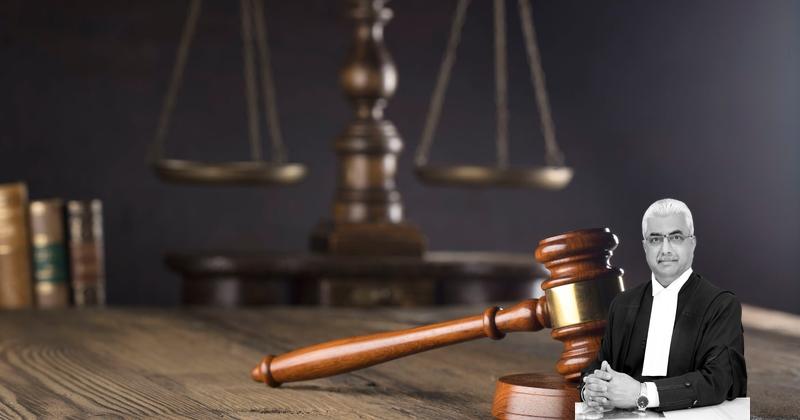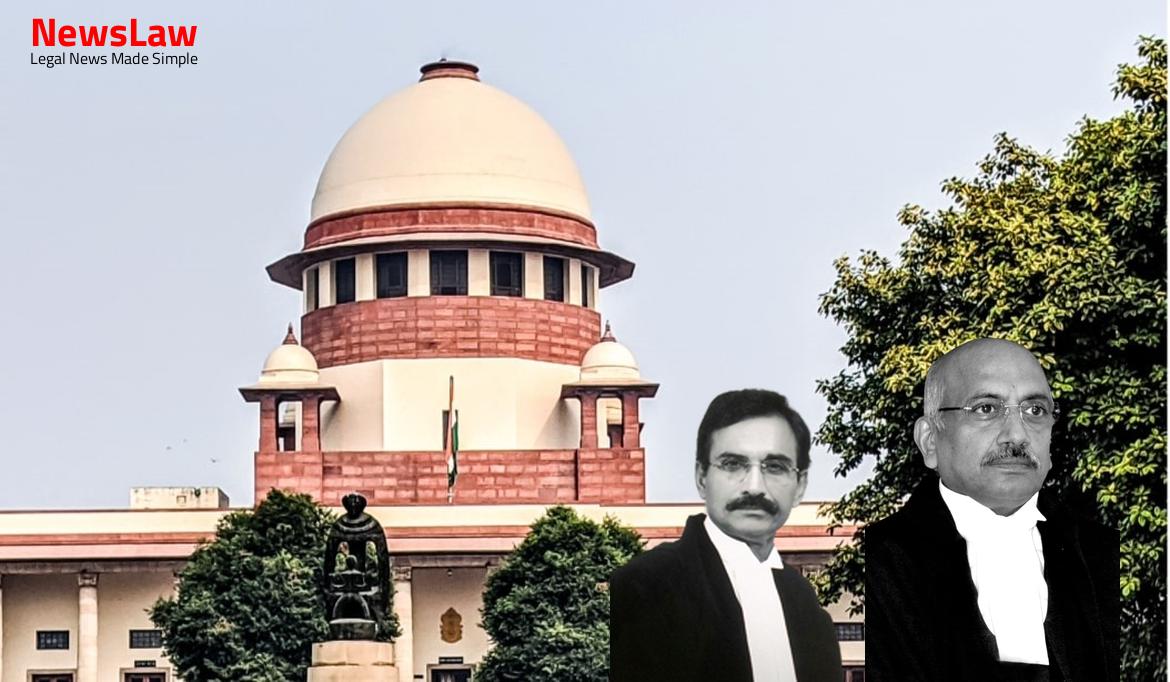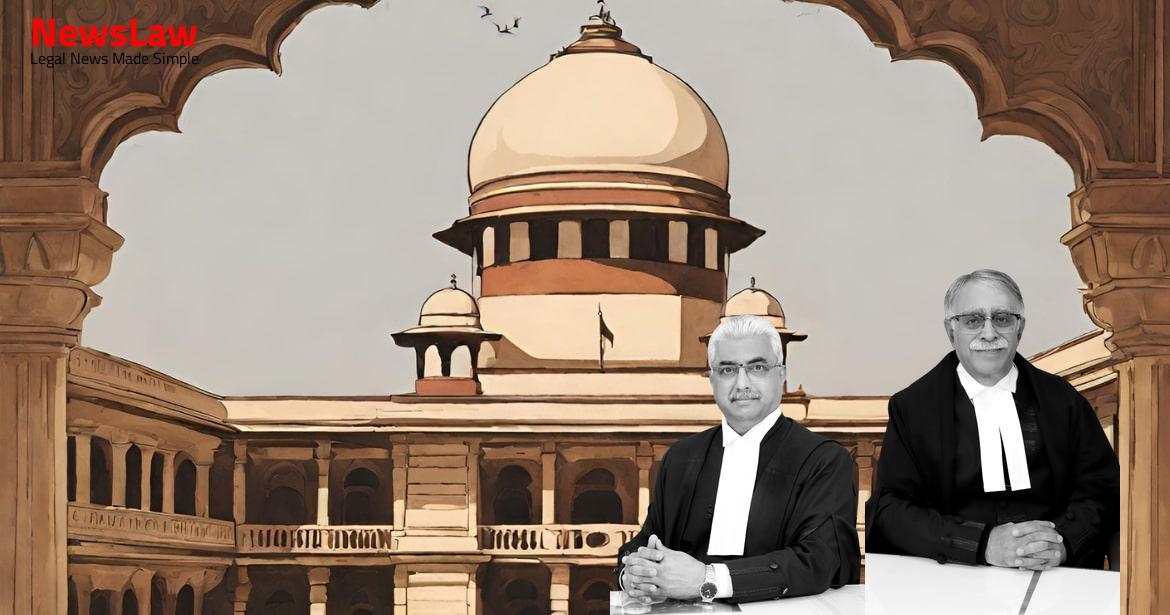The election petition alleged, amongst others, that the appellant had furnished false information in Form 26 (election affidavit); that the Returning Officer had not followed the Election Commission’s guidelines dated 10.10.2018; that the appellant filed false information in C-4 report furnished to the District Election Officer and that there was no previous publication of papers, regarding pending cases against the appellant and those in which he was convicted. It was contended inter alia that the mandatory requirements under Sections 81 and 81 (3) of the Act were not followed; it was alleged that – there was no pleading as to how the nomination paper was improperly accepted; that there was no need to disclose the so-called criminal cases as they did not fall within Section 8 of the Act and Section 33A of the Act as the appellant had not been sentenced to imprisonment of more than one year. These documents were filed in the election proceedings to contest the election petitioner’s assertion. In the present case, the High Court noticed the contentions of the parties as well as the pleadings and was of the opinion that having regard to the terms of Order VII Rule 11 CPC, only the averments in the petition and the accompanying documents could be considered and not any other materials brought on record during the course of the proceedings.
The first related to a criminal case pending before the CJM, Garhwa bearing CR 96P; case No.CF 97/13 dated 20.03.2013 in Form 26, i.e., the election affidavit. Patil (partner) (Case No 20/12), this case pertained to non-payment of minimum wages to workers under the Payment of Wages Act, 1936 and Payment of Wages (Mines) Rules, 1956. The appellant was convicted on 30.07.2013; the second case pertained to State through Labour Enforcement Officer v. It was further stated that the conclusion of the High Court with respect to the non-disclosure of two cases in respect of the Payment of Wages Act and Minimum Wages requiring them to be gone into during the trial is in error.
Also Read: https://newslaw.in/supreme-court/legal-analysis-of-claim-for-loss-of-profit-in-delayed-contract/
It was submitted that going into the merits of whether those cases actually existed, and related to the provisions of the Act, would amount to a mini-trial which is plainly impermissible while considering an application seeking rejection of the petition. Right to information: (1) A candidate shall, apart from any information which he is required to furnish, under this Act or the rules made thereunder, in his nomination paper delivered under sub-section (1) of section 33, also furnish the information as to whether— (i) he is accused of any offence punishable with imprisonment for two years or more in a pending case in which a charge has been framed by the court of competent jurisdiction; (ii) he has been convicted of an offence (3) The returning officer shall, as soon as may be after the furnishing of information to him under sub-section (1), display the aforesaid information by affixing a copy of the affidavit, delivered under sub-section (2), at a con- spicuous place at his office for the information of the electors relating to a constituency for which the nomination paper is delivered.”
Section 8 provides for disqualification of elected candidates, upon their conviction of specified offences. The citizens in a democracy cannot be compelled to stand as silent, deaf and mute spectators to corruption by projecting themselves as helpless. If his right to get proper information is scuttled, in the ultimate eventuate, it may lead to destruction of democracy because he will not be an informed voter having been kept in the dark about the candidates who are Accused of heinous offences.
(v) The candidate as well as the concerned political party shall issue a declaration in the widely circulated newspapers in the locality about the antecedents of the candidate and also give wide publicity in the electronic media. Pursuant to the decision and directions of this court, the Election Commission issued guidelines and also framed forms that were part of guidelines requiring declarations inter alia with respect to disclosure of pending criminal cases and those in which candidate(s) had been convicted.
(a) Candidates at elections to the House of the People, Council of States, Legislative Assembly or Legislative Council who have criminal cases against them, shall publish a declaration about their criminal cases, for wide publicity in newspapers with wide circulation in the constituency area. Publishing of the declaration in newspapers and TV channels is required to be done at least on three different dates during the period mentioned in Para-2(a) above. accommodation, if any, that may have been allotted to the candidates, have now been incorporated in Form-26 itself under Item (8) relating to liabilities to Public Financial Institutions and Govt. In the case of candidates with criminal cases set up by political parties, whether recognized parties or registered unrecognized parties, such candidates are required to declare before the Returning Officer concerned that they have informed their political party about the criminal cases against them.
In the present instance, the relevant form filed by the appellant along with the declaration (Clause 6A) of Form 26 reads as follows: “FORM 26 (See Rule 4A)
Affidavit to be filed by the candidate along with nomination paper before the Returning Officer for Election to the House of the People (Lok Sabha) (Name of the House) from 05-Aheerbad Parliamentary Constituency (name of the Constituency) (ii) below) OR ii)
The following criminal cases are pending against me: (if there are pending criminal cases against the candidate, then tick this alternative and score off alternative (i) above, and give details of all pending cases in the Table (a) FIR No with name and address of Police station concerned List Enclosed Annexure-I List Enclosed Annexure-I List Enclosed Annexure-I (b) Case No with Name of the Court List Enclosed Annexure-I List Enclosed Annexure-I List Enclosed Annexure-I 13 (c) Section(s) of concerned Acts/Codes involved (give no of the Section, e.g. (Tick this alternative, if the candidate has not been convicted and write NOT OR (ii) I have been convicted for the offences mentioned below: NOT APPLICABLE (if the candidate has been convicted, then tick this alternative and score off alternative (i) above, and give details in the Table below): Table (a) Section of IPC, etc.)
Not applicable Not applicable Not applicable (d) Brief description of of- fence for which convicted Not applicable Not applicable Not applicable (e) Dates of orders of convic- tion Not applicable Not applicable (f) Punishment imposed Not applicable Not applicable Not applicable (g) Whether any appeal has been filed against the con- viction (Mention Yes or No) Not applicable Not applicable Not applicable (h) If answer to (g) above is Yes give details and pre- sent status of appeal Not applicable Not applicable 14 (6A) I have given full and up to date information to my political party about all pending criminal cases against me and about all cases of convic- tion as given in paragraphs (5) and (6): Yes.” It is submitted that since the provisions of the Act, in fact, mandate disclosure only in respect of those classes of offences expressly stated, the non-disclosure of information with respect to criminal cases pending where the accused candidate can face punishment for less than two years or has not been convicted of an offence and sentenced to imprisonment for one year or more is not required. The appellant’s main contention is that the election petitioner’s assertions are false inasmuch as they rely upon a document, i.e., copies of certain order sheets in the pending criminal case relating to offences under the Forest Act before the Court in Garhwa and that so far as the past convictions under the Minimum Wages Act and the Payment of Wages Act are concerned, there was no requirement at all.
[A.G.M., Patil Construction, Kutchery Road, P.S.-Garhwa, District- Garhwa.] Santosh Sinha, S/o Radha Prasad Sinha, Bijli Colony, P.S.-Garhwa, District- Garhwa.
Case Title: BHIM RAO BASWANTH RAO PATIL Vs. K.MADAN MOHAN RAO (2023 INSC 641)
Case Number: C.A. No.-004632-004632 / 2023



